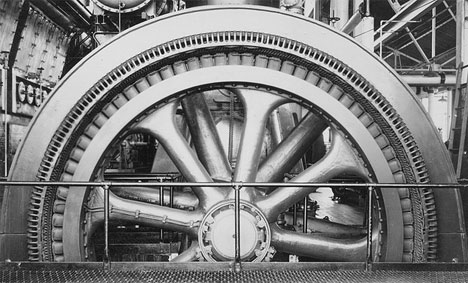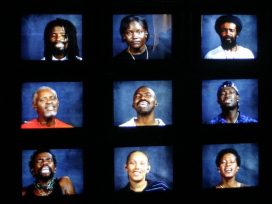Almantas Samalavicius: In your recently published book Surviving Technopolis, you discuss a number of important and overlapping issues that threaten the future of societies. One of the central themes you explore is the rise, dominance and consequences of visual imagery in public discourse, which you say undermines a more literate culture of the past. This tendency has been outlined and questioned by a large and growing number of social thinkers (Marshall McLuhan, Walter Ong, Jacques Ellul, Ivan Illich, Neil Postman and others). What do you see as most culturally threatening in this shift to visual imagery?

General Electric generator in Fordlandia’s powerhouse, c. 1933. Photo: The Henry Ford. Source:Flickr
Arthur W. Hunt III: The shift is technological and moral. The two are related, as Ellul has pointed out. Computer-based digital images stem from an evolution of other technologies beginning with telegraphy and photography, both appearing in the middle of the nineteenth century. Telegraphy trivialized information by allowing it to come to us from anywhere and in greater volumes. Photography de-contextualized information by giving us an abundance of pictures disassociated from the objects from which they came. Cinema magnified Aristotle’s notion of spectacle, which he claimed to be the least artistic element in Poetics. Spectacle in modern film tends to diminish all other elements of drama (plot, character, dialogue and so on) in favour of the exploding Capitol building. Radio put the voice of both the President and the Lone Ranger into our living rooms. Television was the natural and powerful usurper of radio and quickly became the nucleus of the home, a station occupied by the hearth for thousands of years. Then the television split in two, three or four ways so that every house member had a set in his or her bedroom. What followed was the personal computer at both home and at work. Today we have portable computers in which we watch shows, play games, email each other and gaze at ourselves like we used to look at Hollywood stars. To a large extent, these technologies are simply extensions of our technological society. They act as Sirens of distraction. They push serious public discourse into the background and pull triviality to the foreground. They move us away from the Jeffersonian notion of citizenship, replacing it with modern capitalism’s ethic of materialistic desire or “consumership”. The great danger of all this, of course, is that we neglect the polis and, instead, waste our time with bread and circuses. Accompanying this neglect is the creation of people who spend years in school yet remain illiterate, at least by the standards we used to hold out for a literate person. The trivialization spreads out into other institutions, as Postman has argued, to schools, churches and politics. This may be an American phenomenon, but many countries look to America’s institutions for guidance.
AS: Philosopher and historian Ivan Illich – one of the most radical critics of modernity and its mythology – has emphasized the conceptual difference between tools, on one hand, and technology on the other, implying that the dominance and overuse of technology is socially and culturally debilitating. Economist E.F. Schumacher urged us to rediscover the beauty of smallness and the use of more humane, “intermediate technologies”. However, a chorus of voices seems to sink in the ocean of popular technological optimism and a stubborn self-generating belief in the power of progress. Your critique contains no call to go back to the Middle Ages. Nor do you suggest that we give anything away to technological advances. Rather, you offer a sound and balanced argument about the misuses of technology and the mindscape that sacrifices tradition and human relationships on the altar of progress. Do you see any possibility of developing a more balanced approach to the role of technology in our culture? Obviously, many are aware, even if cynically, that technological progress has its downsides, but what of its upsides?
AWH: Short of a nuclear holocaust, we will not be going back to the Middle Ages any time soon. Electricity and automobiles are here to stay. The idea is not to be anti-technology. Neil Postman once said to be anti-technology is like being anti-food. Technologies are extensions of our bodies, and therefore scale, ecological impact and human flourishing becomes the yardstick for technological wisdom. The conventional wisdom of modern progress favours bigger, faster, newer and more. Large corporations see their purpose on earth to maximize profits. Their goal is to get us addicted to their addictions. We can no longer afford this kind of wisdom, which is not wisdom at all, but foolishness. We need to bolster a conversation about the human benefits of smaller, slower, older and less. Europeans often understand this better than Americans, that is, they are more conscious of preserving living spaces that are functional, aesthetically pleasing and that foster human interaction. E.F. Schumacher gave us some useful phraseology to promote an economy of human scale: “small is beautiful,” “technologies with a human face” and “homecomers.” He pointed out that “labour-saving machinery” is a paradoxical term, not only because it makes us unemployed, but also because it diminishes the value of work. Our goal should be to move toward a “third-way” economic model, one of self-sufficient regions, local economies of scale, thriving community life, cooperatives, family owned farms and shops, economic integration between the countryside and the nearby city, and a general revival of craftsmanship. Green technologies – solar and wind power for example – actually can help us achieve this third way, which is actually a kind of micro-capitalism.
AS: Technologies developed by humans (e.g. television) continue to shape and sustain a culture of consumerism, which has now become a global phenomenon. As you insightfully observe in one of your essays, McLuhan, who was often misinterpreted and misunderstood as a social theorist hailed by the television media he explored in a great depth, was fully aware of its ill effects on the human personality and he therefore limited his children’s TV viewing. Jerry Mander has argued for the elimination of television altogether, nevertheless, this medium is alive and kicking and continues to promote an ideology of consumption and, what is perhaps most alarming, successfully conditioning children to become voracious consumers in a society where the roles of parents become more and more institutionally limited. Do you have any hopes for this situation? Can one expect that people will develop a more critical attitude toward these instruments, which shape them as consumers? Does social criticism of these trends play any role in an environment where the media and the virtual worlds of the entertainment industry have become so powerful?
AWH: Modern habits of consumption have created what Benjamin Barber calls an “ethos of infantilization”, where children are psychologically manipulated into early adulthood and adults are conditioned to remain in a perpetual state of adolescence. Postman suggested essentially the same thing when he wrote The Disappearance of Childhood. There have been many books written that address the problems of electronic media in stunting a child’s mental, physical and spiritual development. One of the better recent ones is Richard Louv’s Last Child in the Woods. Another one is Anthony Esolen’s Ten Ways to Destroy the Imagination of Your Child. We have plenty of books, but we don’t have enough people reading them or putting them into practice. Raising a child today is a daunting business, and maybe this is why more people are refusing to do it. No wonder John Bakan, a law professor at the University of British Columbia, wrote a New York Times op-ed complaining, “There is reason to believe that childhood itself is now in crisis.” The other day I was listening to the American television program 60 Minutes. The reporter was interviewing the Australian actress Cate Blanchett. I almost fell out of my chair when she starkly told the reporter, “We don’t outsource our children.” What she meant was, she does not let someone else raise her children. I think she was on to something. In most families today, both parents work outside the home. This is a fairly recent development if you consider the entire span of human history. Industrialism brought an end to the family as an economic unit. First, the father went off to work in the factory. Then, the mother entered the workforce during the last century. Well, the children could not stay home alone, so they were outsourced to various surrogate institutions. What was once provided by the home economy (oikos) – education, heath care, child rearing and care of the elderly – came to be provided by the state. The rest of our needs – food, clothing, shelter and entertainment – came to be provided by the corporations. A third-way economic ordering would seek to revive the old notion of oikos so that the home can once again be a legitimate economic, educational and care-providing unit – not just a place to watch TV and sleep. In other words, the home would once again become a centre for production, not just consumption. If this every happened, one or both parents would be at home and little Johnny and sister Jane would work and play alongside their parents.
AS: I was intrigued by your insight into forms of totalitarianism depicted by George Orwell and Aldous Huxley. Though most authors who discussed totalitarianism during the last half of the century were overtaken by the Orwellian vision and praised this as most enlightening, the alternative Huxleyan vision of a self-inflicted, joyful and entertaining totalitarian society was far less scrutinized. Do you think we are entering into a culture where “totalitarianism with a happy face” as you call it prevails? If so, what consequences you foresee?
AWH: It is interesting to note that Orwell thought Huxley’s Brave New World was implausible because he maintained that hedonistic societies do not last long, and that they are too boring. However, both authors were addressing what many other intellectuals were debating during the 1930s: what would be the social implications of Darwin and Freud? What ideology would eclipse Christianity? Would the new social sciences be embraced with as much exuberance as the hard sciences? What would happen if managerial science were infused into all aspects of life? What should we make of wartime propaganda? What would be the long-term effects of modern advertising? What would happen to the traditional family? How could class divisions be resolved? How would new technologies shape the future?
I happen to believe there are actually more similarities between the Orwell’s 1984 and Huxley’s Brave New World than there are differences. Both novels have as their backstory the dilemma of living with weapons of mass destruction. The novel 1984 imagines what would happen if Hitler succeeded. In Brave New World, the world is at a crossroads. What is it to be, the annihilation of the human race or world peace through sociological control? In the end, the world chooses a highly efficient authoritarian state, which keeps the masses pacified by maintaining a culture of consumption and pleasure. In both novels, the past is wiped away from public memory. In Orwell’s novel, whoever “controls the past controls the future.” In Huxley’s novel, the past has been declared barbaric. All books published before A.F. 150 (that is, 150 years after 1908 CE, the year the first Model T rolled off the assembly line) are suppressed. Mustapha Mond, the Resident Controller in Brave New World, declares the wisdom of Ford: “History is bunk.” In both novels, the traditional family has been radically altered. Orwell draws from Hitler Youth and the Soviets Young Pioneers to give us a society where the child’s loyalty to the state far outweighs any loyalty to parents. Huxley gives us a novel where the biological family does not even exist. Any familial affection is looked down upon. Everybody belongs to everybody, sexually and otherwise. Both novels give us worlds where rational thought is suppressed so that “war is peace”, “freedom is slavery” and “ignorance is strength” (1984). In Brave New World, when Lenina is challenged by Marx to think for herself, all she can say is “I don’t understand.” The heroes in both novels are malcontents who want to escape this irrationality but end up excluded from society as misfits. Both novels perceive humans as religious beings where the state recognizes this truth but channels these inclinations toward patriotic devotion. In 1984, Big Brother is worshipped. In Brave New World, the Christian cross has been cut off at the top to form the letter “T” for Technology. When engaged in the Orgy-Porgy, everyone in the room chants, “Ford, Ford, Ford.” In both novels an elite ruling class controls the populace by means of sophisticated technologies. Both novels show us surveillance states where the people are constantly monitored. Sound familiar? Certainly, as Postman tells us in his foreword to Amusing Ourselves to Death, Huxley’s vision eerily captures our culture of consumption. But how long would it take for a society to move from a happy faced totalitarianism to one that has a mask of tragedy?
AS: Your comments on the necessity of the third way in our societies subjected to and affected by economic globalization seem to resonate with the ideas of many social thinkers I interviewed for this series. Many outstanding social critics and thinkers seem to agree that the notions of communism and capitalism have become stale and meaningless; further development of these paradigms lead us nowhere. One of your essays focuses on the old concept of “shire” and household economics. Do you believe in what Mumford called “the useful past”? And do you expect the growing movement that might be referred to as “new economics” to enter the mainstream of our economic thinking, eventually leading to changes in our social habits?
AWH: If the third way economic model ever took hold, I suppose it could happen in several ways. We will start with the most desirable way, and then move to less desirable. The most peaceful way for this to happen is for people to come to some kind of realization that the global economy is not benefiting them and start desiring something else. People will see that their personal wages have been stagnant for too long, that they are working too hard with nothing to show for it, that something has to be done about the black hole of debt, and that they feel like pawns in an incomprehensible game of chess. Politicians will hear their cries and institute policies that would allow for local economies, communities and families to flourish. This scenario is less likely to happen, because the multinationals that help fund the campaigns of politicians will not allow it. I am primarily thinking of the American reality in my claim here. Unless corporations have a change of mind, something akin to a religious conversion, we will not see them open their hearts and give away their power.
A more likely scenario is that a grassroots movement led by creative innovators begins to experiment with new forms of community that serve to repair the moral and aesthetic imagination distorted by modern society. Philosopher Alasdair MacIntyre calls this the “Benedict Option” in his book After Virtue. Morris Berman’s The Twilight of American Culture essentially calls for the same solution. Inspired by the monasteries that preserved western culture in Europe during the Dark Ages, these communities would serve as models for others who are dissatisfied with the broken dreams associated with modern life. These would not be utopian communities, but humble efforts of trial and error, and hopefully diverse according to the outlook of those who live in them. The last scenario would be to have some great crisis occur – political, economic, or natural in origin – that would thrust upon us the necessity reordering our institutions. My father, who is in his nineties, often reminisces to me about the Great Depression. Although it was a miserable time, he speaks of it as the happiest time in his life. His best stories are about neighbours who loved and cared for each other, garden plots and favourite fishing holes. For any third way to work, a memory of the past will become very useful even if it sounds like literature. From a practical point of view, however, the kinds of knowledge that we will have to remember will include how to build a solid house, how to plant a vegetable garden, how to butcher a hog and how to craft a piece of furniture. In rural Tennessee where I live, there are people still around who know how to do these things, but they are a dying breed.
AS: The long (almost half-century) period of the Cold War has resulted in many social effects. The horrors of Communist regimes and the futility of state-planned economics, as well as the treason of western intellectuals who remained blind to the practice of Communist powers and eschewed ideas of idealized Communism, have aided the ideology of capitalism and consumerism. Capitalism came to be associated with ideas of freedom, free enterprise, freedom to choose and so on. How is this legacy burdening us in the current climate of economic globalization? Do you think recent crises and new social movements have the potential to shape a more critical view (and revision) of capitalism and especially its most ugly neo-liberal shape?
AWH: Here in America liberals want to hold on to their utopian visions of progress amidst the growing evidence that global capitalism is not delivering on its promises. Conservatives are very reluctant to criticize the downsides of capitalism, yet they are not really that different in their own visions of progress in comparison to liberals. It was amusing to hear the American politician Sarah Palin describe Pope Francis’ recent declarations against the “globalization of indifference” as being “a little liberal.” The Pope is liberal? While Democrats look to big government to save them, Republicans look to big business. Don’t they realize that with modern capitalism, big government and big business are joined at the hip? The British historian Hilarie Belloc recognized this over a century ago, when he wrote about the “servile state,” a condition where an unfree majority of non-owners work for the pleasure of a free minority of owners. But getting to your question, I do think more people are beginning to wake up to the problems associated with modern consumerist capitalism. A good example of this is a recent critique of capitalism written by Daniel M. Bell, Jr. entitled The Economy of Desire: Christianity and Capitalism in a Postmodern World. Here is a religious conservative who is saying the great tempter of our age is none other than Walmart. The absurdist philosopher and Nobel Prize winner Albert Camus once said the real passion of the twentieth century was not freedom, but servitude. Jacques Ellul, Camus’s contemporary, would have agreed with that assessment. Both believed that the United States and the Soviet Union, despite their Cold War differences, had one thing in common – the two powers had surrendered to the sovereignty of technology. Camus’ absurdism took a hard turn toward nihilism, while Ellul turned out to be a kind of cultural Jeremiah. It is interesting to me that when I talk to some people about third way ideas, which actually is an old way of thinking about economy, they tell me it can’t be done, that we are now beyond all that, and that the our economic trajectory is unstoppable or inevitable. This retort, I think, reveals how little freedom our system possesses. So, I can’t have a family farm? My small business can’t compete with the big guys? My wife has to work outside the home and I have to outsource the raising of my children? Who would have thought capitalism would lack this much freedom?
AS: And finally are you an optimist? Jacques Ellul seems to have been very pessimistic about us escaping from the iron cage of technological society. Do you think we can still break free?
AWH: I am both optimistic and pessimistic. In America, our rural areas are becoming increasingly depopulated. I see this as an opportunity for resettling the land – those large swaths of fields and forests that encompass about three quarters of our landmass. That is a very nice drawing board if we can figure out how to get back to it. I am also optimistic about the fact that more people are waking up to our troubling times. Other American writers that I would classify as third way proponents include Wendell Berry, Kirkpatrick Sale, Rod Dreher, Mark T. Mitchell, Bill Kauffman, Joseph Pearce and Allan Carlson. There is also a current within the American and British literary tradition, which has served as a critique of modernity. G.K. Chesterton, J.R.R. Tolkien, Dorothy Day and Allen Tate represent this sensibility, which is really a Catholic sensibility, although one does not have to be Catholic to have it. I am amazed at the popularity of novels about Amish people among American evangelical women. Even my wife reads them, and we are Presbyterians! In this country, the local food movement, the homeschool movement and the simplicity movement all seem to be pointing toward a kind of breaking away. You do not have to be Amish to break away from the cage of technological society; you only have to be deliberate and courageous. If we ever break out of the cage in the West, there will be two types of people who will lead such a movement. The first are religious people, both Catholic and Protestant, who will want to create a counter-environment for themselves and their children. The second are the old-school humanists, people who have a sense of history, an appreciation of the cultural achievements of the past, and the ability to see what is coming down the road. If Christians and humanists do nothing, and let modernity roll over them, I am afraid we face what C.S. Lewis called “the abolition of man”. Lewis believed our greatest danger was to have a technological elite – what he called The Conditioners – exert power over the vast majority so that our humanity is squeezed out of us. Of course all of this would be done in the name of progress, and most of us would willingly comply. The Conditioners are not acting on behalf of the public good or any other such ideal, rather what they want are guns, gold, and girls – power, profits and pleasure. The tragedy of all this, as Lewis pointed out, is that if they destroy us, they will destroy themselves, and in the end Nature will have the last laugh.







